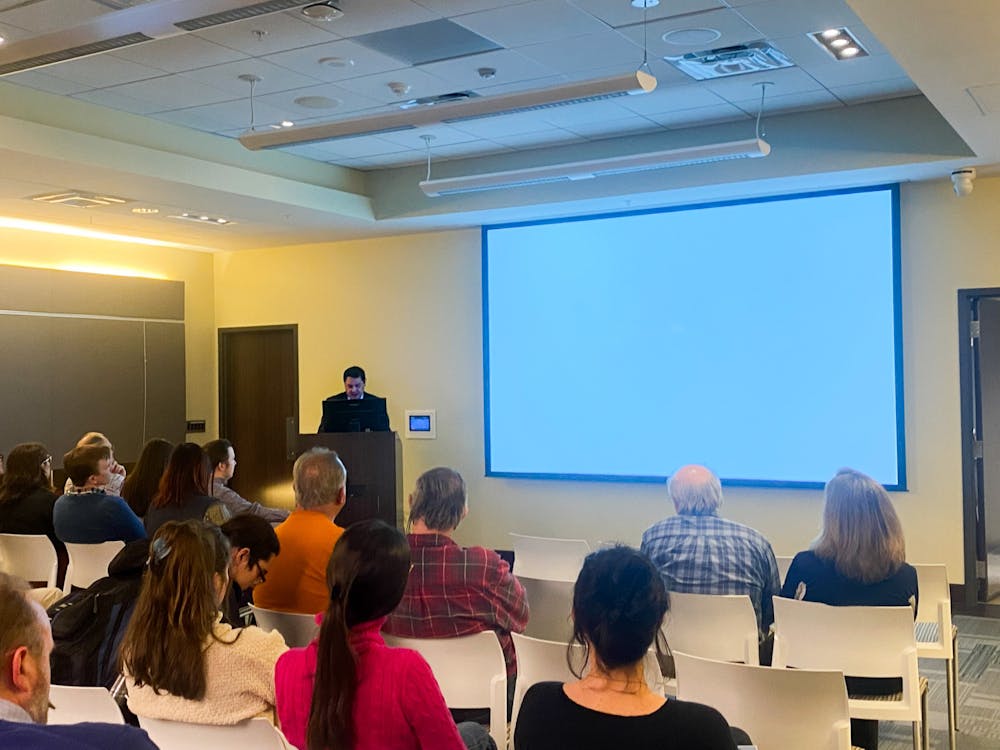John Beaver, a Muscogee citizen and museum curator, gave a lecture on Muscogee history in the Ralph Brown Draughon Library on Feb. 6 at 3 p.m. as a part of the "Discover Auburn Culture" lecture series.
The Muscogee nation is a branch of the Creek tribe that resides in the Southeastern region of the United States. The Muscogee were considered one of the five “civilized” tribes under the civilization plan of the 19th century that was proposed by George Washington.
In Georgia, the Muscogee resided in Columbus, which is a part of Muscogee county, an hour away from Auburn University. In 2004, the College of the Muscogee Nation was founded in Okmulgee, Oklahoma. Muscogee, who still reside in the Southeastern United States, have other higher education institutions in their county, one being Troy University at Columbus.
During the 1830s, the U.S. government forced the Muscogee tribe to move to Oklahoma on the Trail of Tears as part of the Indian Removal Act. A small group was allowed to stay in their region in Alabama and are now known as the Poarch Band of Creek Indians. The Muscogee still in Alabama today reside in Atmore on the Poarch Creek reservation.
The lecture opened with Mark Wilson, the organizer of the lecture. Wilson gave attendees an introduction to the speaker, John Beaver, a member of the Muscogee.
Beaver works at the Muscogee Nation Cultural Center and Archives department as a manager for the Creek Council House museum in Okmulgee, Oklahoma. The Creek Council House works as a museum that honors Muscogee history after the Indian Removal Act. The house honors the place where the present day Muscogee government was established in 1868.
“Our tribe found themselves involved in the Civil War for their own various reasons. A number of members of our tribe sided with the Union because we wanted representation of our own,” Beaver said. “The house we know today is the second council house we know of, built in 1907.”
Beaver began his lecture with the history of Native American history. He mentioned he chose his field of work and study – anthropology – because he can “make something meaningful” out of history.
He connected Native history to George Orwell’s “1984" and claimed Orwell’s quote “Who controls the past, controls the future” can apply to the history and erasure of the history of Native American cultures.
“Distorting and dehumanizing history allows for imaginations to desensitize our history,” Beaver said. “Changing history doesn’t change how it played out, but it does allow for inaccurate stories like Pocahontas. We all have something to learn from history. It isn’t all just peace, love and understanding.”
Beaver continued to address the "tumultuous" history of Native Americans and how such stories have been erased and forgotten among American history, causing many tribes to be lost.
“Seemingly ignoring and divorcing these cultures from the precontact past affects the way we look at history today,” Beaver said. “Museums are connected to the colonization process in the American Indian culture instead of the natural historical process.”
Beaver also taught attendees about the Native American territory in Oklahoma. Telling listeners that there are 38 federally recognized tribes, which have all resettled in Oklahoma, Beaver claimed that the Muscogee settlement formed in 1868 in Oklahoma acts as their capital.
He said that the land that had been set aside during the Native removal was already home for other tribes, which caused more of a push on the people. However, after settling in 1868, the Muscogee started a code of laws.
“We weren’t impacted by the Dawes Act because we stopped signing treaties. In 1898, there was an amendment made called the Curtis Act which stopped the singular rule of tribal governments,” Beaver said. “We kept a good relationship with the federal government, but we had to join on the federal government’s rule. However, our land wasn’t considered government property.”
The Dawes Act allotted the Native Americans their reservation land in Oklahoma. It was sponsored by Henry L. Dawes, the senator from Massachusetts. It provided 160 acres to each family and 80 acres to unmarried adults on the terms that they couldn't leave their land for 25 years.
The act was amended in 1898, which is known as the Curtis Act. This act stopped the rule of Native governments on their land and allotted authority to the Dawes Commission. The eradication of tribal governments, land claims and courts allowed for Oklahoma to become a state in 1907.
He went further to say there was a settlement in present day Macon, Georgia, that acted as the Muscogee capital before the removal act. The settlement is now known as Ocmulgee Mounds National park.
Beaver closed with how important it is that this history is remembered. He claimed that “we need to preserve the past and the future” as well as allow room for diversity.
“I’m humbled by the fact that my ancestors took that long walk that allowed me to be here today,” Beaver said.
A further opportunity to learn about the Muscogee Nation will be on Mar. 26, 2024, at 6 p.m. at Pebble Hill, where Dr. Monte Randall will deliver an overview on the history, culture and contemporary life of the Muscogee.
Do you like this story? The Plainsman doesn't accept money from tuition or student fees, and we don't charge a subscription fee. But you can donate to support The Plainsman.

Brychelle Brooks, senior majoring in public and professional writing with a minor in information systems, has been with The Auburn Plainsman since August 2023. She previously served as the Campus Reporter, Opinion Editor and Newsletter Editor. She is currently serving as the Editor-in-Chief.





